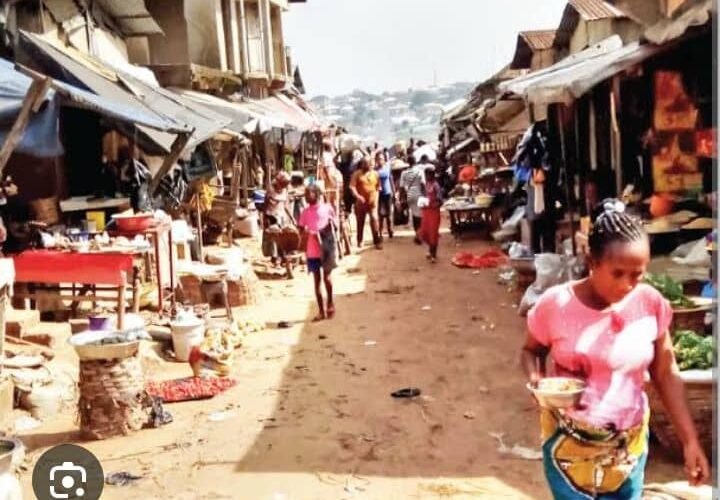Food Chains, Poverty, and Development in Abia State: A Critical Analysis

Abia State is predominantly agrarian, with a significant portion of its population engaged in farming and related activities. Despite its agricultural potential, the state grapples with persistent poverty, food insecurity, and underdevelopment, which are exacerbated by inefficiencies in its food chains. A critical analysis of these issues reveals that the food chain—encompassing production, processing, distribution, and consumption—plays a pivotal role in either perpetuating or alleviating poverty and underdevelopment. By examining the structural weaknesses within the food chain, the socio-economic conditions of the population, and the broader developmental challenges, this analysis seeks to uncover the root causes of these interconnected problems and propose actionable solutions to foster sustainable development.
The food chain in Abia State is characterized by a heavy reliance on smallholder farmers who cultivate staple crops such as cassava, yam, maize, and palm oil. These farmers, who often operate on a subsistence level, face numerous challenges that hinder their productivity and profitability. Poor infrastructure, including dilapidated road networks and inadequate storage facilities, leads to significant post-harvest losses, estimated at over 30% for some crops. Additionally, limited access to modern farming techniques, quality seeds, and fertilizers further constrains agricultural output. The distribution segment of the food chain is equally problematic, with middlemen often exploiting farmers by offering low prices for their produce while consumers face high prices due to inefficiencies in the market. Urbanization has also disrupted traditional food systems, as rural-urban migration reduces the labor force available for farming while increasing demand for food in cities. These inefficiencies in the food chain not only limit the state’s agricultural potential but also contribute to food insecurity, as many households struggle to access affordable and nutritious food.
Poverty remains a pervasive issue in Abia State, with a significant portion of the population living below the national poverty line. Economic indicators reveal high unemployment rates, low income levels, and limited access to basic services such as healthcare and education. Rural areas, where the majority of the population resides, are particularly affected, with poverty rates often exceeding those in urban centers. The agricultural sector, which should serve as a driver of economic growth and poverty reduction, is instead plagued by low productivity and poor returns on investment. Smallholder farmers, who constitute the backbone of the food chain, are trapped in a cycle of poverty due to their inability to scale up production and access lucrative markets. Food insecurity is both a cause and consequence of poverty, as impoverished households struggle to afford adequate nutrition, leading to malnutrition and poor health outcomes. Women, children, and the elderly are disproportionately affected, further exacerbating social inequalities and hindering overall development.
Development in Abia State is further hampered by a range of structural and systemic challenges. Infrastructure deficits, particularly in transportation and energy, create significant bottlenecks in the food chain, making it difficult for farmers to transport their produce to markets and for businesses to operate efficiently. Policy gaps at both the state and federal levels have also undermined agricultural development, with limited government support for farmers in the form of subsidies, credit facilities, or extension services. Education and skills development are critical yet neglected areas, as many rural residents lack the technical knowledge and entrepreneurial skills needed to innovate and improve agricultural practices. Environmental degradation, including soil erosion, deforestation, and the adverse effects of climate change, poses additional threats to food production and livelihoods. These challenges are compounded by broader national issues such as economic instability, political corruption, and inadequate investment in the agricultural sector, all of which hinder Abia State’s developmental progress.
The interconnection between food chains, poverty, and development in Abia State is both complex and multifaceted. On one hand, a well-functioning food chain has the potential to drive economic growth, create employment opportunities, and reduce poverty by increasing agricultural productivity and incomes. On the other hand, inefficiencies in the food chain perpetuate poverty by limiting access to markets, reducing farmers’ incomes, and increasing food prices for consumers. Case studies from within and outside Nigeria demonstrate that targeted interventions in the food chain, such as improved infrastructure, access to credit, and market linkages, can significantly enhance agricultural productivity and livelihoods. However, the success of such interventions depends on addressing the broader systemic issues that hinder development, including weak governance, inadequate policies, and environmental challenges. Global and national factors, such as fluctuating food prices and economic policies, also play a critical role in shaping the local food chain and its impact on poverty and development.
A critical analysis of these issues reveals both strengths and weaknesses in Abia State’s food chain and its potential to drive development. The state’s rich agricultural heritage and favorable climate are significant strengths that can be leveraged to boost food production and economic growth. However, systemic weaknesses, including poor infrastructure, limited access to resources, and weak policy frameworks, undermine these strengths and perpetuate poverty. Opportunities for improvement abound, particularly through the adoption of modern agricultural technologies, the promotion of sustainable farming practices, and the development of robust public-private partnerships. At the same time, threats such as climate change, political instability, and economic downturns pose significant risks to the food chain and its potential to contribute to development. Addressing these challenges requires a holistic and integrated approach that prioritizes the needs of smallholder farmers, strengthens the food chain, and fosters an enabling environment for sustainable development.
To address these challenges, a series of recommendations can be proposed. First, policy interventions are needed to strengthen agricultural policies and provide targeted support to farmers, including subsidies, credit facilities, and access to quality inputs. Second, infrastructure development must be prioritized to improve road networks, storage facilities, and market access, thereby reducing post-harvest losses and enhancing the efficiency of the food chain. Third, capacity-building programs should be implemented to equip farmers and entrepreneurs with the skills and knowledge needed to adopt modern farming techniques and improve productivity. Fourth, sustainable agricultural practices must be promoted to mitigate environmental degradation and ensure long-term food security. Finally, public-private partnerships should be encouraged to mobilize resources, foster innovation, and create synergies between stakeholders in the food chain. These measures, if effectively implemented, have the potential to transform Abia State’s food chain into a powerful engine for poverty reduction and sustainable development.

In conclusion, the critical analysis of food chains, poverty, and development in Abia State underscores the urgent need to address the inefficiencies and systemic challenges that hinder agricultural productivity and perpetuate poverty. By strengthening the food chain, empowering smallholder farmers, and fostering an enabling environment for development, Abia State can unlock its agricultural potential and achieve sustainable economic growth. This requires a concerted effort from all stakeholders, including the government, private sector, civil society, and international partners, to implement targeted interventions and create lasting change. Future research should focus on identifying best practices, evaluating the impact of interventions, and exploring innovative solutions to further enhance the food chain and its contribution to development. Only through such comprehensive and collaborative efforts can Abia State overcome its developmental challenges and build a prosperous future for its people.
Dr Chukwuemeka Ifegwu Eke writes from the University of Abuja/Yakubu Gowon University Nigeria







